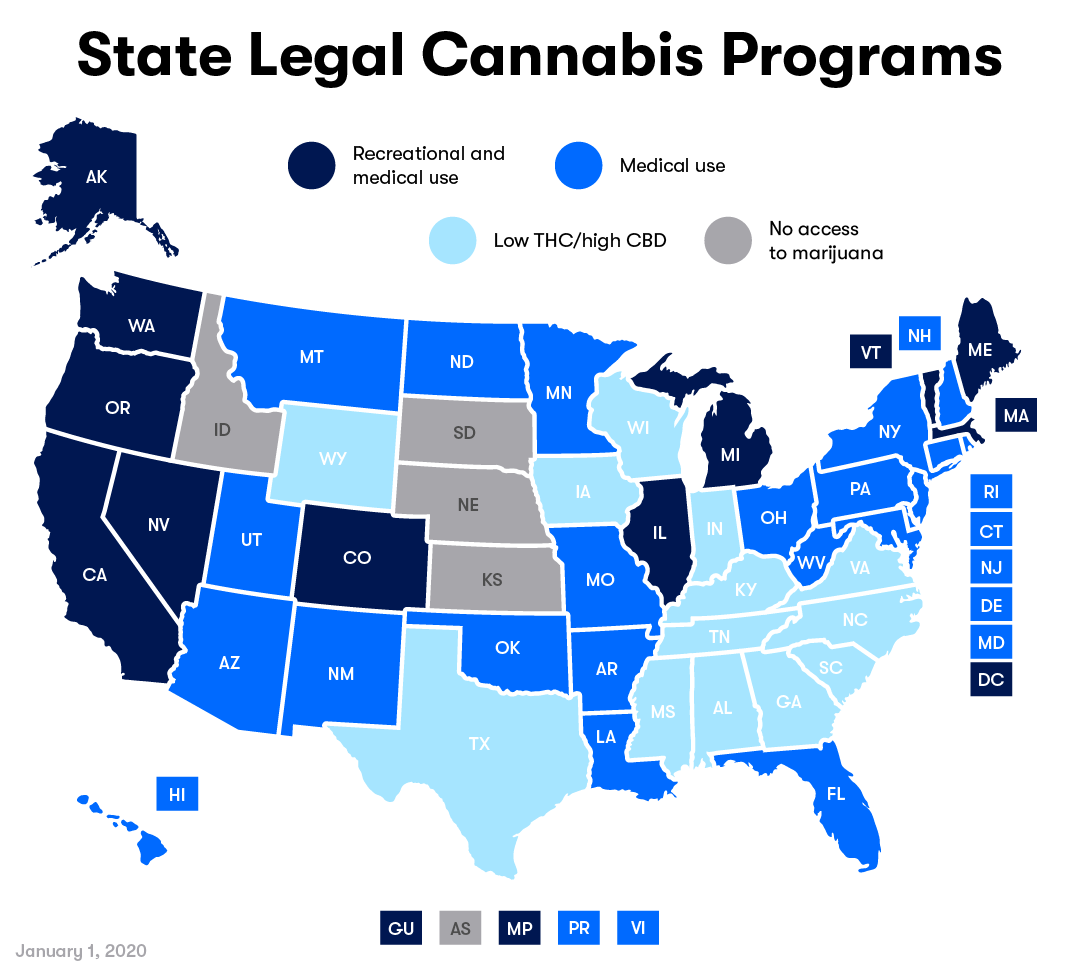Marijuana and Rental Properties: What Landlords and Property Managers Should Know

January 26, 2018
4 Minute Read
This map reflects each state and territory’s laws around marijuana use as of January 1, 2020. For subsequent changes, check your state or territory’s legislature website.
Zillow, Inc. and its affiliates do not provide legal advice. This material has been prepared for informational purposes only, and it is not intended to provide and should not be relied on for legal advice. You should consult with a qualified legal adviser before you make any final decisions about your rental property.
The movement to legalize medical and recreational marijuana is gaining speed across the country and its territories. Currently 11 states, Washington, D.C., and two U.S. territories have approved some form of recreational marijuana use. Yet whether you call it weed, pot, cannabis or marijuana, it’s still illegal at the federal level. So, what does this mean for residential property owners and landlords?
Know your state or territory’s laws
The laws for each state and territory differ. For example, 33 states, D.C., and three U.S. territories allow medical marijuana use. Thirteen states have legalized 'low THC, high cannabidiol (CBD)' products, while keeping recreational and medical marijuana illegal. Some states have decriminalized the possession of marijuana while not legalizing its use. There are 11 states where possessing small amounts of marijuana (without medical authorization) is still a crime. That’s why it’s important to research your own state or territory’s laws and consult local legal experts when necessary.
Decide where you stand
Just as you can prohibit cigar or cigarette smoking in your rental, it may also be possible to set limits on marijuana smoking, or even its use, on your property.
When deciding whether to allow cannabis use on your property, consider the impact of your decision should you have tenants who are using it for medical reasons. At the same time, consider the impact of marijuana use on neighbors or other tenants. If you choose to prohibit marijuana use on some level, do so with the complete understanding of the laws in your state or territory, and include the appropriate clause in your lease.
Know before you grow
There are some very specific differences between states and territories when it comes to growing marijuana. Some states and territories allow growing a certain number of pot plants at home, with some laws even specifying how many can be flowering at the same time. In other areas, rules differ for recreational and medical use — and still others allow only qualified medical marijuana users to grow their own.
With these nuances, one thing is constant: The allowed amounts are enough for personal use only. Growing for resale and distribution requires a specific license from the state government.
As a landlord or property owner, you can decide if you want to allow tenants to grow marijuana on your rental property. Things to consider include electricity use from indoor growing lights or whether plants growing outdoors could encourage trespassers onto your property. You can prohibit growing altogether by including a clause in the lease.
Put it in the lease
Once you decide how you want to handle issues related to cannabis, work with your legal advisers to incorporate relevant terms into the lease or other documentation.
States and territories where recreational and medical marijuana is legal
In places where recreational use is legal, and if you’re over 21, it’s generally OK to keep an amount sufficient for personal use and use it in your residence. “Use” is often defined as smoking or vaping, but it also includes consuming edibles and tinctures or using products topically.
- Alaska
- California
- Colorado
- District of Columbia
- Guam
- Illinois
- Maine
- Massachusetts
- Michigan
- Nevada
- Northern Mariana Islands
- Oregon
- Vermont
- Washington
States and territories where only medical marijuana is legal
States and territories with medical marijuana laws generally have some form of patient registry, which may provide some protection against arrest for possession up to a certain amount of marijuana for personal medicinal use.
| Arizona Arkansas Connecticut Delaware Florida | Hawaii Louisiana Maryland Minnesota Missouri | Montana New Hampshire New Jersey New Mexico New York* | North Dakota Ohio Oklahoma Pennsylvania Puerto Rico | Rhode Island Utah Virgin Islands West Virginia |
* New York has decriminalized marijuana possession. It is not legal to use recreationally, but users can only receive a monetary fine for possession and not a criminal or misdemeanor charge.
States where only “low THC, high cannabidiol (CBD)” product use is legal
States that allow cannabidiol product use but still ban recreational and medical marijuana have generally done so to treat children with treatment-resistant forms of epilepsy.
| Alabama Georgia Indiana | Iowa Kentucky Mississippi | North Carolina South Carolina Tennessee | Texas Virginia Wisconsin | Wyoming |
States where possession of small amounts of marijuana is still a crime
There are 11 states that have legalized medical marijuana but can criminally charge people for possessing small amounts of cannabis without proof they’re using it for medical purposes. States that have legalized recreational use have also decriminalized possession.
| Arizona Arkansas Florida | Hawaii Louisiana Montana | New Jersey North Dakota Pennsylvania | Utah West Virginia |
States with no access to marijuana
There are four states where marijuana possession and use is still strictly illegal — that means no CBD use and no medical or recreational marijuana use.
| Idaho | Kansas | Nebraska | South Dakota |
Connect with us!
Learn how Zillow Rentals can help you reach your goals.
Stay informed. Stay ahead.
Access exclusive industry insights, market trends, and expert tips. Subscribe now to receive quarterly Zillow Rentals newsletters!